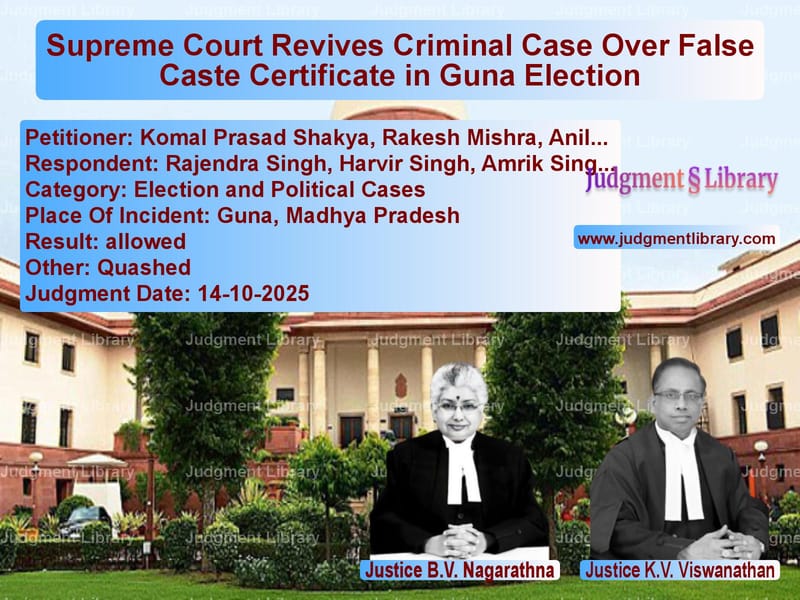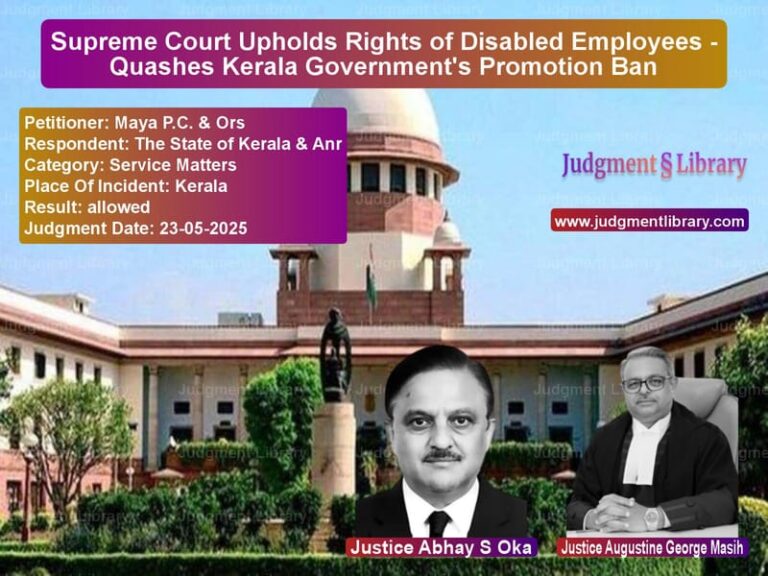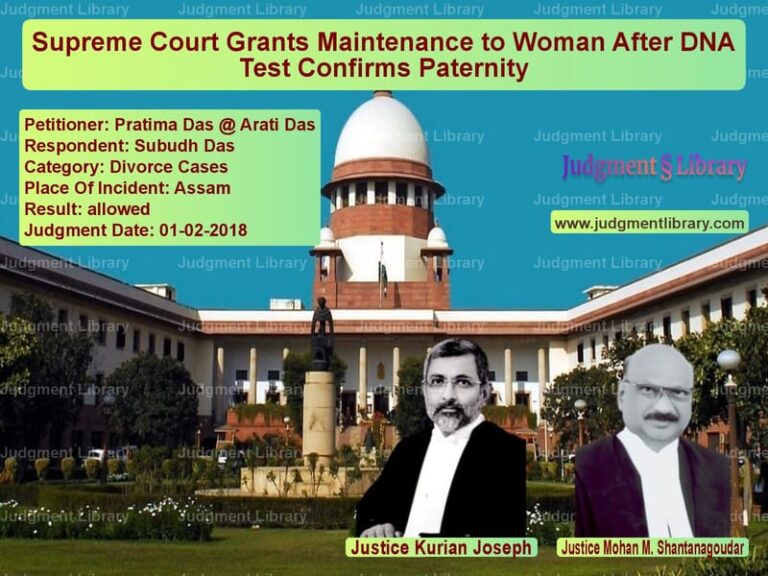Supreme Court Revives Criminal Case Over False Caste Certificate in Guna Election
In a significant ruling that underscores the seriousness of obtaining benefits through fraudulent means, the Supreme Court of India has set aside a High Court order that had quashed criminal proceedings against a former legislator and his associates. The case revolves around allegations that Rajendra Singh, who won from the Guna Assembly constituency reserved for Scheduled Castes, secured his candidature using a false caste certificate.
The legal battle began when a complainant, Komal Prasad Shakya, approached the Chief Judicial Magistrate in Guna, alleging that Rajendra Singh, who belonged to the General Category, fraudulently obtained a certificate identifying him as a member of the ‘Sansi’ community, a Scheduled Caste. This allowed him to contest and win from a reserved seat. The magistrate took cognizance of the offence, but the accused successfully got the proceedings quashed by the Madhya Pradesh High Court. The Supreme Court’s recent judgment has now revived the criminal case, directing a swift trial.
The Core of the Allegations
The criminal complaint painted a detailed picture of the alleged conspiracy. It stated that Rajendra Singh and his father, Amrik Singh, had consistently identified themselves as belonging to the General Category throughout their lives. Documents like school records and ration cards showed their caste as ‘Sikh’ or General. However, just two months before the election declarations in 2008, Rajendra Singh applied for and obtained a caste certificate stating he was a ‘Sansi’.
The complaint alleged that this was not an innocent mistake but a calculated move. It accused Rajendra Singh of submitting false affidavits and applications. Furthermore, it implicated several others in a conspiracy to help him secure the certificate. For instance, it was alleged that Kiran Jain, a councilor, and Harvir Singh, from the Gurudwara Management Committee, provided false certifications knowing that Rajendra Singh was not a Sansi. Other government officials, including a Tehsildar and a Sub-Divisional Officer, were accused of issuing the certificate without following due procedure and based on forged documents like a manipulated panchnama (witness testimony).
The foundation of the prosecution’s case was strengthened when the Caste Certificate Scrutiny Committee, after a thorough inquiry, cancelled the certificate in 2011. The committee found that there were no certified documents proving that Rajendra Singh’s family was resident in Madhya Pradesh before 1950, a key requirement. It also noted that the revenue officers had shown undue favour and bypassed prescribed procedures. This cancellation was upheld right up to the Supreme Court, which dismissed Rajendra Singh’s challenge.
The High Court’s View and the Supreme Court’s Disagreement
The Madhya Pradesh High Court, while quashing the criminal case, had taken a view that was ultimately found to be erroneous by the Supreme Court. The High Court had speculated that Rajendra Singh and his family might have been unaware of their caste status due to “legal illiteracy.” It suggested that “being a member of ‘Sikh’ community, father or grandfather of the applicant Rajendra Singh would not have thought that they can claim for various reservations on the basis of their caste.”
The High Court also delved into the evidence, noting that information from the Tehsildar of Amritsar had stated that Rajendra Singh’s forefathers were registered as ‘Sansi’. Since this information was not proven to be manipulated, the High Court reasoned that the act of obtaining a caste certificate based on it could not be considered cheating. It concluded that no offences of forgery or cheating were made out.
The Supreme Court, however, strongly disagreed with this approach. The bench of Justices B.V. Nagarathna and K.V. Viswanathan held that the High Court had overstepped its bounds by conducting a “mini-trial” at the stage of quashing. The Supreme Court found the High Court’s findings to be “conjectural and patently erroneous.” It emphasized that at the initial stage, the court only needs to see if the complaint, taken at face value, discloses a prima facie case. The truth of the allegations is to be tested during the trial, not at the quashing stage.
Arguments Before the Supreme Court
The appellants, represented by Mr. Anuj Bhandari, argued that the case was a classic example of cheating and forgery. They contended that Rajendra Singh, after a lifetime of being a General Category candidate, suddenly obtained a caste certificate on the eve of elections to usurp a seat reserved for Scheduled Castes. Relying on the judgment in Kumari Madhuri Patil, they argued that a false claim of social status must be prosecuted. Mr. Bhandari submitted that “the matter ought to have been set down for trial and should not have been nipped in the bud.” On the point of cheating, he argued that the caste certificate itself was a “property” which was acquired through deception.
On the other side, the respondents, represented by Senior Counsel Ms. Ruchi Kohli, defended the quashment. She argued that the complaint was a “witch-hunt” and that no criminality was found by the Scrutiny Committee. She contended that for forgery to be made out, the complainant must allege that the accused themselves signed or executed the forged document, which was not the case here. She asserted that “obtaining documents based on false information would not be forgery” and that there was no malicious intent, as they acted on information from the Amritsar Tehsildar’s office.
The Supreme Court’s Verdict and Its Implications
After considering the arguments, the Supreme Court allowed the appeals, setting aside the High Court’s order. The Court found that the complaint did indeed disclose prima facie offences under Sections 420 (cheating), 467 (forgery of valuable security), 468 (forgery for purpose of cheating), and 471 (using as genuine a forged document) of the Indian Penal Code against Rajendra Singh, and these read with Section 120B (criminal conspiracy) against Amrik Singh, Harvir Singh, and Kiran Jain.
The Court was categorical that the defence of the accused could not be examined at this preliminary stage. The question of whether Rajendra Singh was genuinely unaware of his caste or acted in good faith based on the Amritsar records is a matter for trial. The Court noted the specific allegations in the complaint about the preparation of a false panchnama, which formed the basis for the certificate, and held that this warranted a full trial.
In its concluding remarks, the Court directed the trial to be concluded expeditiously, within one year, considering the complaint was filed back in 2014. It also instructed the trial court to proceed uninfluenced by the observations made by either the High Court or the Supreme Court in the quashing proceedings.
This judgment reinforces a fundamental legal principle: criminal proceedings should not be short-circuited at the threshold if a prima facie case exists. It sends a strong message that serious allegations of manipulating the electoral process through fraudulent caste certificates must be thoroughly investigated and adjudicated upon in a trial. For the public, it reaffirms faith in the legal system’s ability to address grievances related to the misuse of reservation policies, which are designed for the empowerment of historically disadvantaged communities.
Petitioner Name: Komal Prasad Shakya, Rakesh Mishra, Anil Sharma.Respondent Name: Rajendra Singh, Harvir Singh, Amrik Singh, Kiran Jain.Judgment By: Justice B.V. Nagarathna, Justice K.V. Viswanathan.Place Of Incident: Guna, Madhya Pradesh.Judgment Date: 14-10-2025.Result: allowed.
Don’t miss out on the full details! Download the complete judgment in PDF format below and gain valuable insights instantly!
Download Judgment: komal-prasad-shakya,-vs-rajendra-singh,-harv-supreme-court-of-india-judgment-dated-14-10-2025.pdf
Directly Download Judgment: Directly download this Judgment
See all petitions in Fraud and Forgery
See all petitions in Reservation Cases
See all petitions in Criminal Conspiracy
See all petitions in Judgment by B.V. Nagarathna
See all petitions in Judgment by K.V. Viswanathan
See all petitions in allowed
See all petitions in Quashed
See all petitions in supreme court of India judgments October 2025
See all petitions in 2025 judgments
See all posts in Election and Political Cases Category
See all allowed petitions in Election and Political Cases Category
See all Dismissed petitions in Election and Political Cases Category
See all partially allowed petitions in Election and Political Cases Category







